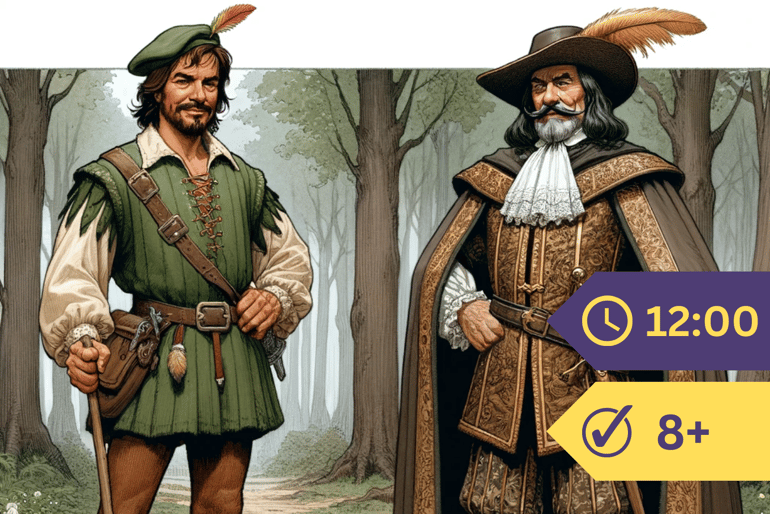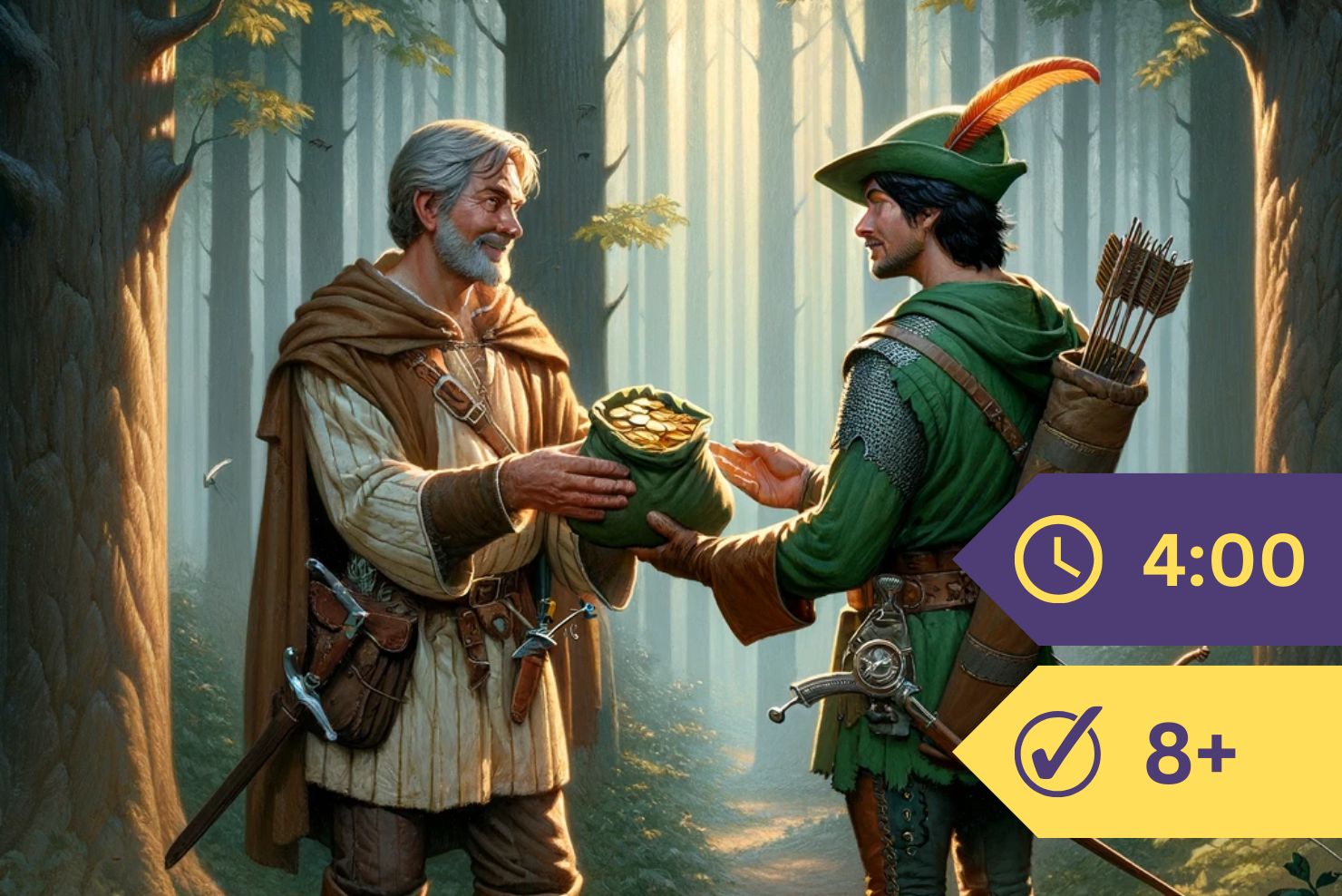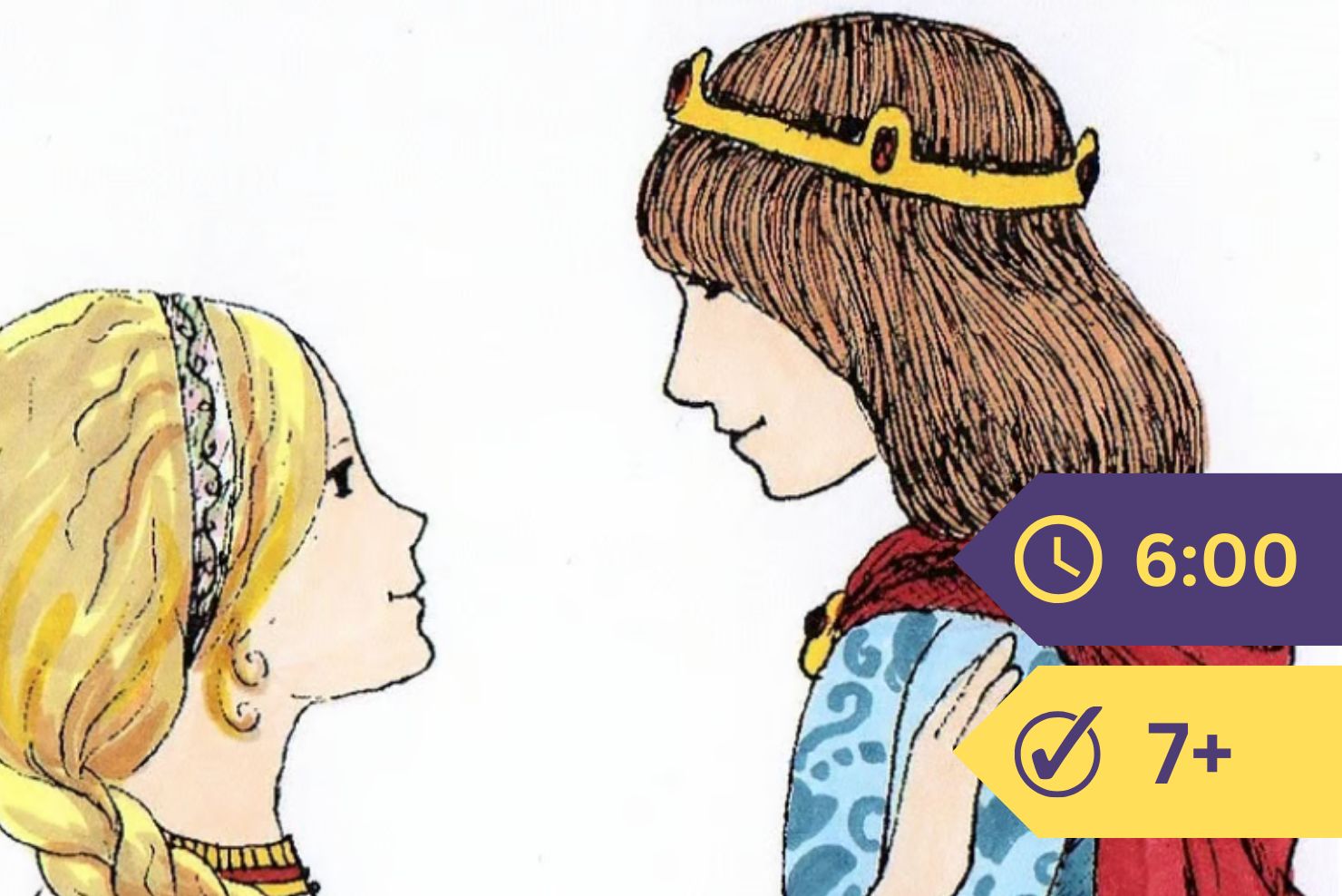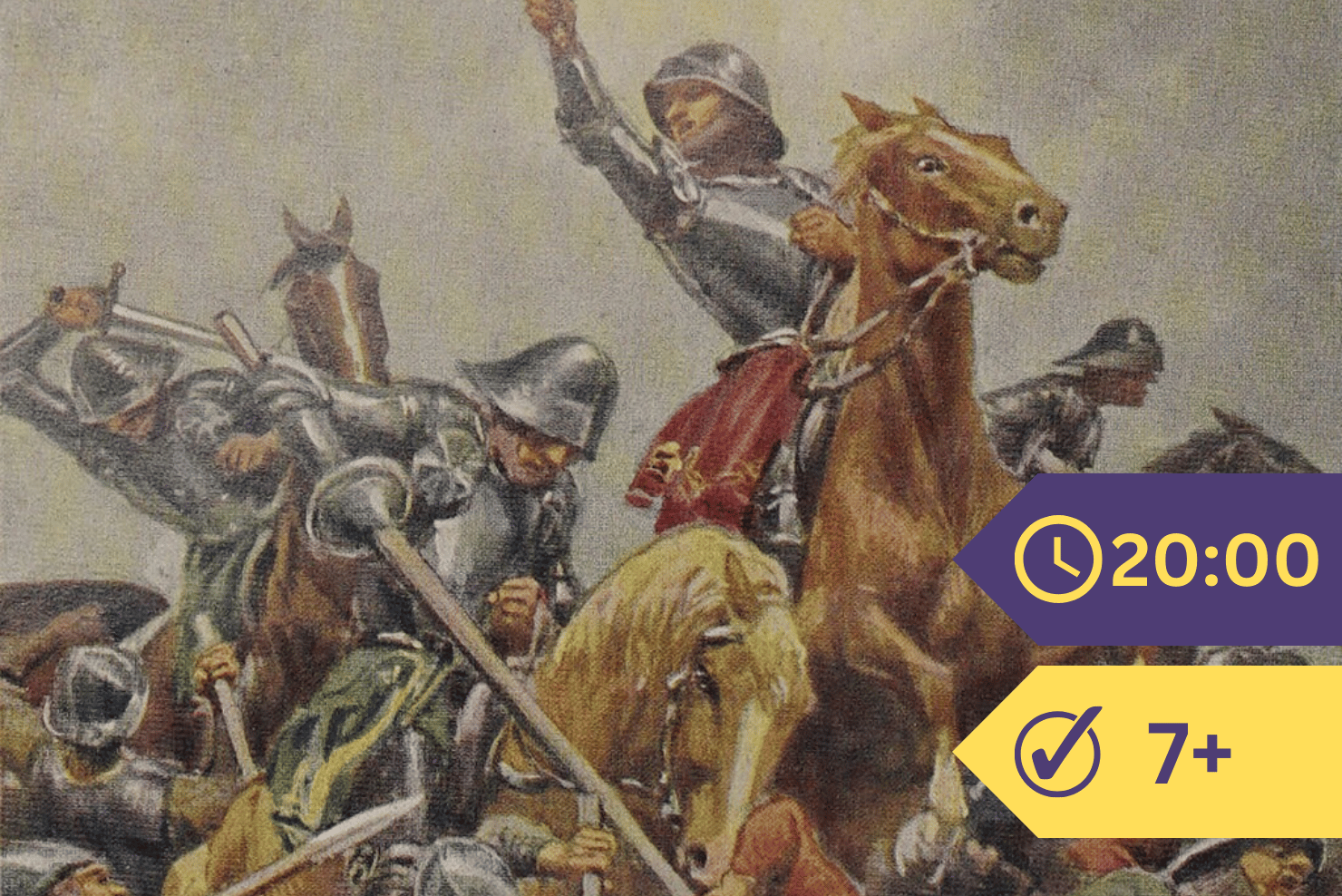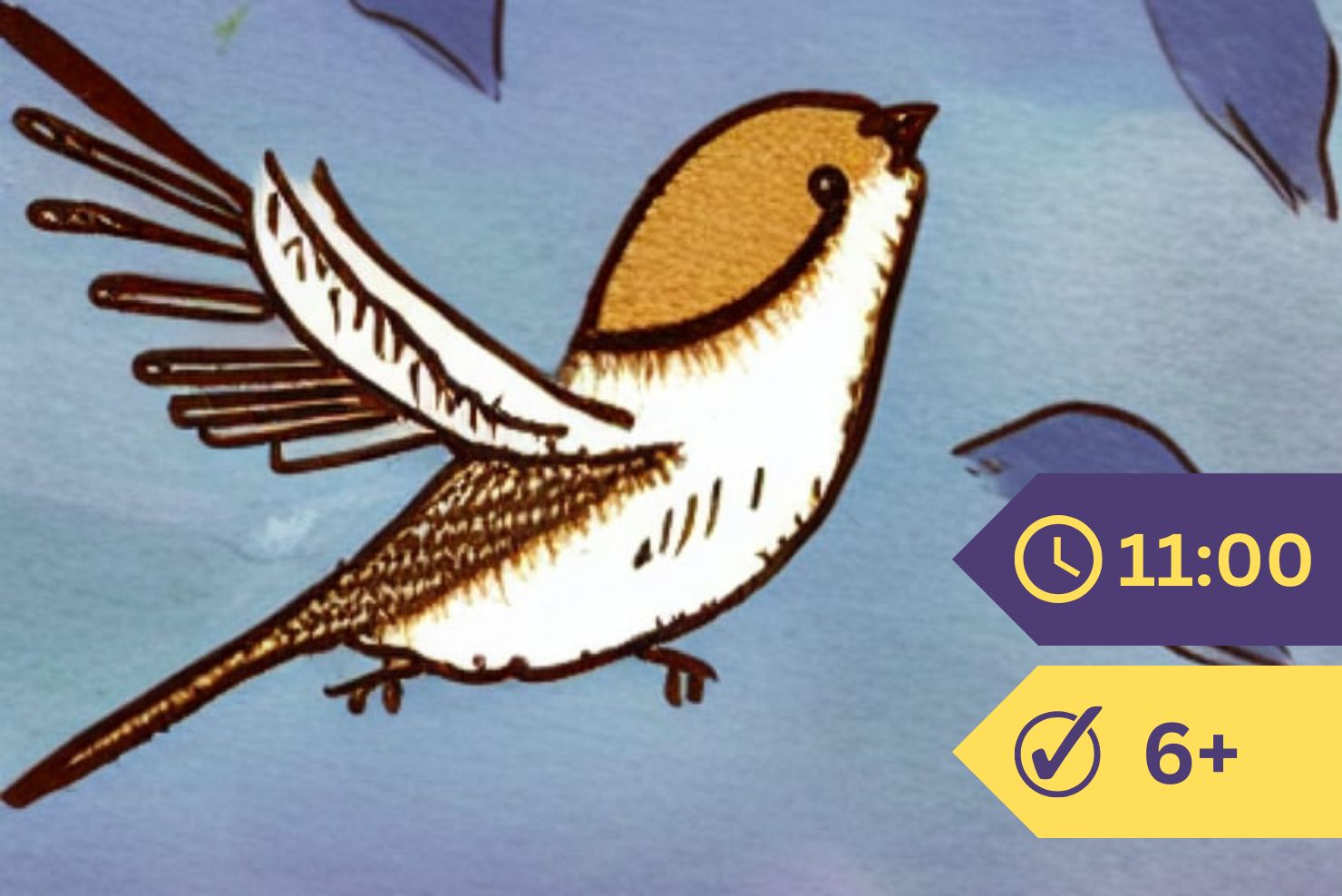It will be remembered that when the poor knight left Robin Hood in the forest Little John went with him to act as his yeoman. He stayed for some time in Sir Richard’s service, and a light and pleasant post he found it, for he was free to do pretty much as he liked.
It happened one fine day that the young men of Nottingham were eager to go shooting, so Little John fetched his bow, and said he would meet them in a trial of skill. While the match was going on, the Sheriff of Nottingham chanced to pass, and he stood for a while near the marks to watch the sport.
Three times Little John shot, and each time he cleft the wand.
“By my faith, this man is the best archer that ever I saw,” cried the sheriff. “Tell me now, my fine lad, what is your name? In what county were you born, and where do you dwell?”
“I was born at Holderness,” said Little John, “and when I am at home men call me Reynold Greenleaf.”
“Tell me, Reynold Greenleaf, will you come and live with me? I will give you twenty marks a year as wages.”
“I have a master already, a noble knight,” answered Little John. “It would be better if you would get leave of him.”
The sheriff was so pleased with the prowess of Little John that he wanted to get him into his own service, so he went to the knight, and it was agreed the sheriff should have him for twelve months. Little John was therefore given at once a strong horse, well equipped, and now behold him the sheriff’s man.
But Little John had not forgotten Robin Hood’s words of warning about the sheriff; he knew him to be a false and greedy man, and a ruthless enemy to the outlaws, and Little John was always thinking how he could pay him out for his treachery.
“By my loyalty and truth,” said Little John to himself, “I will be the worst servant to him that ever he had.”
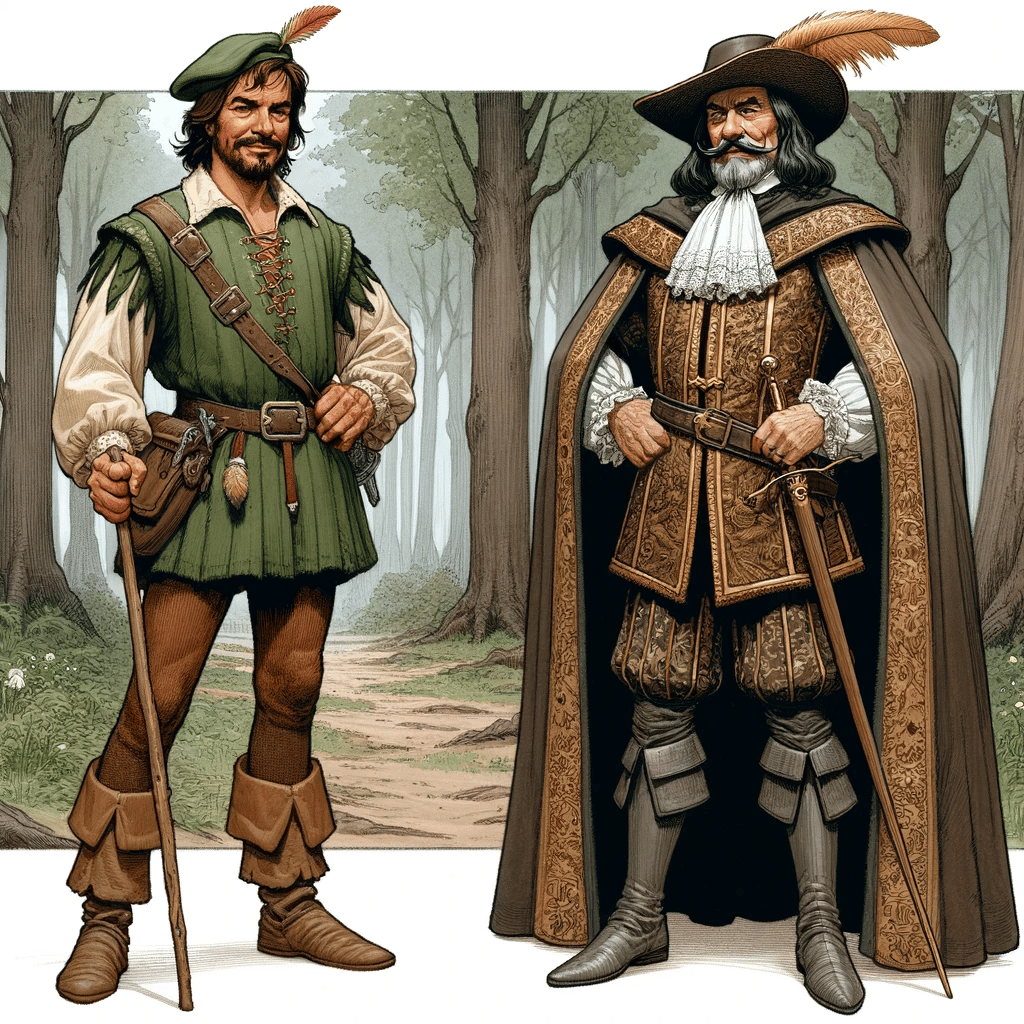
Little John soon found that his new place was little to his liking. The other servants were not well pleased to see the newcomer; they were jealous of the favour shown to him at first by his master, and treated him with rudeness and contempt. The sheriff himself was very mean; he wished to secure Little John for his service, for he knew such a comely lad and fine archer would do him credit, but once he was sure of him he paid no heed to seeing that he was properly lodged and fed.
It happened one day the sheriff went out hunting, and Little John was left at home forgotten. No meal was served to him, and he was left fasting till noon. As he was by this time very hungry he went to the steward, and asked civilly for something to eat.
“Good sir steward, I pray thee give me to dine,” he said. “It is too long for Greenleaf to be so long fasting, therefore I pray thee, steward, give me my dinner.”
“I’ve had no orders,” said the steward rudely. “Thou shalt have nothing to eat or to drink till my lord comes back to town.”
“Rather than that I’ll crack thy head,” said Little John.
The steward started forward to the buttery, and shut fast the door, but Little John gave him such a rap on his back it almost broke in two—as long as he lived he would be the worse for the blow. Then Little John put his foot to the door, and burst it open, and Little John went in and helped himself plentifully to both ale and wine.
“Since you will not dine, I will give you to drink,” he said to the steward; “though you live for a hundred years you shall remember Little John.”
He ate and drank for as long as he chose, and the steward dared say nothing, for he was still smarting from the blow. But the sheriff had in his employ a cook, a bold, sturdy man, and he was no coward either.
“A fine sort of fellow you are to dwell in a house and ask for dinner thus,” he cried, and he dealt Little John three good blows.
“I vow I am very well pleased with those strokes of yours,” said Little John, “and before I leave this place you shall be tested better.”
He drew his good sword, and the cook seized another, and they went for each other then and there. Neither had any thought of giving in, but both meant to resist stoutly. There they fought sorely for a whole hour, and neither could in any way harm the other.
“Thou art truly one of the very best swordsmen that ever I saw,” said Little John. “Couldst thou shoot as well with a bow thou shouldst go with me to the greenwood. Thou wouldst have from Robin Hood twenty marks a year as wages, and a change of clothing twice a year.”
“Put up thy sword, and we will be comrades,” said the cook.
He fetched at once for Little John a right good meal—dainty venison, good bread, and excellent wine—and they both ate and drank heartily. When they had well feasted they plighted their troth together that they would be with Robin that self-same night. Then they ran as fast as they could to the sheriff’s treasury, and though the locks were of good steel they broke them every one. They carried off all the silver plate—vessels, dishes, gold pieces, cups, and spoons, nothing was forgotten.
They took also the money—three hundred and three pounds—and then they went off straight to Robin Hood in the forest.
“God save thee, my dear master,” cried Little John.
“Welcome art thou, and also that fair yeoman whom thou bringest with thee,” said Robin Hood. “What tidings from Nottingham, Little John?”
“The proud sheriff greeteth thee well, and sendeth you here by me his cook and his silver vessels and three hundred and three pounds,” said Little John.
“I dare take my oath it was never by his good will these goods come to me,” laughed Robin.
Thus they all made merry in the greenwood, and said the sheriff had been rightly paid for the greed and tyranny with which he performed the duties of his office, for by bribery and oppression he had got his ill-earned wealth.
Presently Little John bethought him of a shrewd device by which they could still further get the better of him. He ran into the forest here and there, and when he had gone about five miles it fell out as he wished; he came across the sheriff himself hunting with hound and horn. Little John was mindful of his manners, and went and knelt on his knee before him, and saluted him courteously.
“Why, Reynold Greenleaf, where hast thou been now?” cried the sheriff.
“I have been in the forest,” said Little John, “and there I have seen a wondrous sight, one of the finest I ever yet saw. Yonder I saw a right gallant hart; his colour is green. Seven score of deer in a herd altogether are with him. His antlers are so sharp, master, I durst not shoot, for dread lest they should slay me.”
“By heaven, I would fain see that sight,” said the sheriff.
“Turn thy steps thither, then, at once, dear master,” said Little John. “Come with me; I will show you where he lies.”
The sheriff rode off, and Little John ran beside him, for he was full smart of foot. Through the forest they went, and by-and-by they came to Robin Hood in the midst of his band of yeomen.
“Lo, there is the master hart,” said Little John. The sheriff stood still in dismay, and he was a sorry man.
“Woe worth thee, Reynold Greenleaf, thou hast betrayed me.”
“Ye are to blame, master, I swear,” said Little John. “When I was at home with you I was misserved of my dinner.”
Then the outlaws made their guest sit down to supper with them, which he did with no good will, for he would fain have departed to his home at Nottingham. He was served on his own silver dishes, and when he saw his beautiful cups and vessels the sheriff for sorrow could not eat.
“Cheer up, sheriff,” urged Robin Hood. “For the sake of Little John thy life is granted thee. What, man, eat and be merry! Here is fine fat venison served in a goodly vessel.”
By the time they had well supped, the day was done. Robin then bade his men strip the sheriff of his fine clothes, his hose and his shoes, his kirtle, and the large handsome coat all trimmed with fur—and to give him in their place a green mantle to wrap himself in. He further bade his sturdy lads all to lie round the sheriff in a circle under the greenwood tree, so that he might see them, and know there was no chance of escape.
It was a sorry night the sheriff passed, cold and shivering, in his shirt and breeches, on the hard ground; small wonder that his bones ached, and that he sighed piteously for his soft warm bed at home.
“Come, come, sheriff, cheer up!” said Robin; “for this is our order, you know, under the greenwood tree.”
“This is a harder order than any anchorite or friar!” groaned the sheriff. “For all the gold in merry England I would not dwell here long.”
“Thou wilt dwell here with me for the next twelve months,” said Robin. “I shall teach thee, proud sheriff, to be an outlaw.”
“Before I lie here another night, Robin, smite off my head rather, and I’ll forgive it thee,” said the sheriff. “Let me go, for pity’s sake!” he begged, “and I will be the best friend that ever thou hadst.”
“Before I let thee go, thou shalt swear me here an oath,” said the outlaw. “Swear on my sword that thou wilt never seek to do me harm by water or by land. And if thou find any of my men, by night or by day, thou shalt swear on thy oath to help them all thou canst.”
There was no other way to get back his freedom, so the sheriff was compelled to take the oath demanded by Robin. Then he was allowed to depart, and he went back to Nottingham a sad and sorry man, feeling that he had had more than enough of the greenwood to last him a very long time.

